Guest blogged from DC by Margie Burns
These are interesting times. A short update on the most recent legal motions in the Libby case:
As we know, in a Grant of Executive Clemency on July 2, George W. Bush commuted all prison terms for I. Lewis ‘Scooter’ Libby. The grant states that it leaves “intact and in effect the two-year term of supervised release, with all its conditions, and all other components of the sentence.”
What with Libby not having served any time, Judge Walton, the trial judge in the Libby case, ordered input from prosecution and defense on the question of whether there could be any “release” – and consequently any “supervised release,” i.e. probation.
First response came from Fred Fielding, Esq., now Counsel to the President. Fielding was the man who helped Nixon negotiate the shoals of the Watergate investigation --- speaking of no jail time --- concluding with Nixon’s resignation followed in short order by a presidential pardon even without a conviction – and, according to Nixon and then-President Gerald Ford, without even a request for a pardon. One sees why Fielding would be welcome aboard the current White House.
Fielding’s letter, dated July 6, remarks,
Fielding continues,
So, Fielding goes on to conclude, since the presidential proclamation says Libby will be on probation, on probation he shall be:
The ruling on Libby’s probation has at this writing not yet been handed down. I still wonder how it will be possible, or whether it would be possible, for Libby to violate the conditions of his probation if he does end up on supervised release.
It’s not too likely that he’ll start dealing to support himself, or engage in any of the acts typically prohibited by probation. But what about consorting with his former acquaintances, or being seen around his former hangouts? Does his conviction mean that he has to refrain for two years from obstruction of justice?
READER COMMENTS ON
"Judge's Ruling Yet to Come; Will Libby Be On Probation?"
(5 Responses so far...)
COMMENT #1 [Permalink]
...
Dredd
said on 7/11/2007 @ 10:51 am PT...
Margie,
Another day another scandal of stonewalling and hiding the truth of high crimes and misdemeanors.
Anyway, all of these subpoena's folks can't go against the Pardoner in Chief if they want a pardon can they?
So, he has shown his hand, and if they want to draw a get out of jail free card, they must submit to him.
I think that this fascist regime has taken law and order off the table.
And to make matters worse, the congress has taken impeachment off the table.
The people need to take the crooks and liars off the table.
COMMENT #2 [Permalink]
...
X
said on 7/11/2007 @ 11:36 am PT...
This issue is not even a close call. The Supreme Court has already held that:
http://laws.lp.findlaw.c.../getcase/US/419/256.html
(a) The executive pardoning power under the Constitution, which has consistently adhered to the English common-law practice, historically included the power to commute sentences on conditions not specifically authorized by statute. United States v. Wilson, 7 Pet. 150; Ex parte Wells, 18 How. 307. Pp. 260-266.
(b) Since the pardoning power derives from the Constitution alone, it cannot be modified, abridged, or diminished by any statute, including Art. 118, and Furman v. Georgia, supra, did not affect the conditional commutation of petitioner's sentence. Pp. 266-268.
COMMENT #3 [Permalink]
...
Dredd
said on 7/13/2007 @ 8:15 am PT...
Judge Walton had this to say:
The 30-month sentence for Libby, Walton observed, was at the low end of federal sentencing guidelines. The Bush administration and the Justice Department, he pointed out, have been strong proponents of those guidelines for judges, which are supposed to ensure that defendants in federal cases receive similar sentences for the same crimes."Indeed, only recently the president's attorney general called for the passage of legislation to 'restore the binding nature of the sentencing guidelines so that the bottom of the recommended sentencing range would be a minimum for judges, not merely a suggestion,'" Walton wrote.
He also questioned whether Bush had the constitutional power to order the supervised release without sending Libby to jail. The form of probation, according to the law, is supposed to be reserved for after someone has served time.
"The president has effectively rewritten the statutory scheme on an ad hoc basis to make the punishment created by Congress applicable to a situation that Congress clearly did not intend," Walton wrote.
While the pardon powers are broad, "it is far more unsettled … whether the president may transmute a duly crafted form of punishment into one that is expressly proscribed by statute," the judge wrote. "The court concludes, with great reservation, that it does not" offend the Constitution.
Walton ordered Libby to report to the federal probation office "with all requisite haste." He noted that if Libby failed to comply with any condition of his supervised release, he would be sent to prison.
(LA Times, emphasis added).
COMMENT #4 [Permalink]
...
JUDGE OF JUDGES
said on 7/14/2007 @ 9:54 pm PT...
Scooter Libby Libby Libby's going to Jail ! JAIL ! JAIL !
He will Take it Take it Take it up the Tail! TAIL ! TAIL !
Scooter Libby Libby Libby had some Power ! POWER ! POWER !
Better Hold onto the Soap in the Shower! SHOWER ! SHOWER !
SHIT !!! I hope I can return all this K Y Jelly.
COMMENT #5 [Permalink]
...
flyover_27
said on 7/16/2007 @ 6:01 pm PT...
Level of corrruption is bad, we are nearly drowning!
I sent this letter to my Senators and House Rep. today regarding the corrupted state of the Office of Special Counsel and the Merit Systems Protection Board. I encourage everyone else to do so too!
---------------------July 16, 2007
Dear Senator_________________ (or ) Representative_________________
I have been reading about the ongoing problems with the Office of Special Counsel (OSC) and the Merit Systems Protection Board (MSPB).
I have been researching issues for some time involving whistleblowers and the corruption that causes them to become whistleblowers and have blogs on this topic to help share information and encourage people to stand up to wrongdoing. I also have a family member who found themselves being labeled a whistleblower just because they responsibly and ethically did the job they were hired by the federal government to do.
It would appear there is an extremely poor track record of the OSC and MSPB for about 30 years, and that no reforms or changes made have helped. It does not appear to me at any time, but particularly now, that these organizations should be under the wing of the Executive branch, where they may be easily prevented from accomplishing their intended mission.
Since we seem to be having such a crisis at this time all throughout government, and in severely hampered if not corrupted federal agencies and offices across the country, and the Justice Department is just about non-functional, due to influence and manipulation coming from the Executive branch, I think the only real solution is to pass the laws protecting all whistleblowers including federal and defense department (S.274 and others) and then putting the investigations of allegations of wrongdoing under the legislative/Congressional branch. It appears the best efforts are being made through Congress right now in the various committee investigative efforts. Abolishing the OSC and the MSPB as the agencies under the Executive Branch, moving their mission to Congressional oversight, cleaning up the Justice Dept. and their deadening affect on all of the various criminal investigative agencies, and seeing to the very careful screening of any further Executive Branch appointed judges (Prevent any more appointments of constitutional revisionists and those who put partisan policy/politics ahead of the U.S. Constitution!) would go along way to helping to straighten this out.
The new Congressional entity will need to be adequately funded, and must have the funds restricted for use by this mission, not be able to be siphoned off to other things. The funding currently sent to OSC and MSPB should be dedicated to the new Congressional mission of overseeing the process of whistleblower complaints, and seeing that they are handled in an ethical manner. I personally have more faith in Congress right now than the other branches, and feel if there is a problem with someone in Congress not doing their job I would have more ability to address that problem, than I do dealing with trying to change the puppeteer masters, from three steps away, the way it is now.
Please sponsor a bill which will address these issues, and vote to get these changes implemented and help the many federal whistleblowers and others who are suffering never ending retribution due to the total dysfunction of these Executive branch controlled agencies.
Sincerely,
***************
For more information on Whistleblower issues see:
http://whistleblowersupporter.typepad.com
Advertiser Privacy Policy | The BradCast logo courtesy of Rock Island Media.
Web Hosting, Email Hosting, & Spam Filtering for The BRAD BLOG courtesy of Junk Email Filter.


 Trump Labor Dept. Warns Trump Policies Sparking Food Shortage, Farmworker Crisis: 'BradCast' 10/9/25
Trump Labor Dept. Warns Trump Policies Sparking Food Shortage, Farmworker Crisis: 'BradCast' 10/9/25 'Green News Report' 10/9/25
'Green News Report' 10/9/25
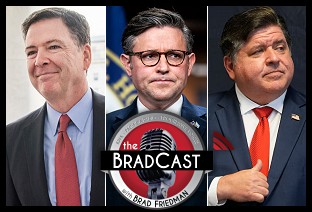 Trump's Losing Battles: 'BradCast' 10/8/25
Trump's Losing Battles: 'BradCast' 10/8/25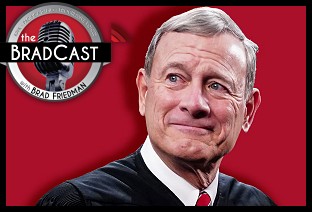 'Supreme Arrogance': Trump, John Roberts and His Stacked, Packed and Captured SCOTUS: 'BradCast' 10/7/25
'Supreme Arrogance': Trump, John Roberts and His Stacked, Packed and Captured SCOTUS: 'BradCast' 10/7/25 'Green News Report' 10/7/25
'Green News Report' 10/7/25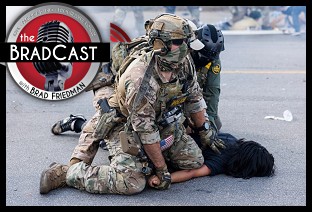 Trump Attempting His
Trump Attempting His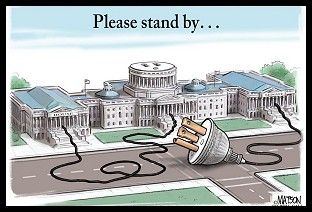 Sunday 'Shutshow' Toons
Sunday 'Shutshow' Toons Biden Budget Expert: Mass Firings in Shutdown 'Extremely Illegal': 'BradCast' 10/2/25
Biden Budget Expert: Mass Firings in Shutdown 'Extremely Illegal': 'BradCast' 10/2/25 'Green News Report' 10/2/25
'Green News Report' 10/2/25 Why is DOJ Suing 'Blue' States for Their Voter Databases?: 'BradCast' 10/1/25
Why is DOJ Suing 'Blue' States for Their Voter Databases?: 'BradCast' 10/1/25 'A War from Within' Trump's Twisted Mind: 'BradCast' 9/30/25
'A War from Within' Trump's Twisted Mind: 'BradCast' 9/30/25 'Green News Report' 9/30/25
'Green News Report' 9/30/25 'Fear is the Tool of a Tyrant':
'Fear is the Tool of a Tyrant': Sunday 'Long Arm/Small Man' Toons
Sunday 'Long Arm/Small Man' Toons 'Green News Report' 9/25/25
'Green News Report' 9/25/25 I Don't Know What This Means, But I Thought You Should Know: 'BradCast' 9/25/25
I Don't Know What This Means, But I Thought You Should Know: 'BradCast' 9/25/25 Gov't Shutdown Looms as Dems Fight to Save Healthcare Subsidies: 'BradCast' 9/24/25
Gov't Shutdown Looms as Dems Fight to Save Healthcare Subsidies: 'BradCast' 9/24/25 Updates: Homan Bribery; Kimmel Censorship; Our Insane Prez at U.N.: 'BradCast' 9/23/25
Updates: Homan Bribery; Kimmel Censorship; Our Insane Prez at U.N.: 'BradCast' 9/23/25 Trump 'Border Czar' Took $50k in Sting, DOJ Dropped the Case: 'BradCast' 9/22/25
Trump 'Border Czar' Took $50k in Sting, DOJ Dropped the Case: 'BradCast' 9/22/25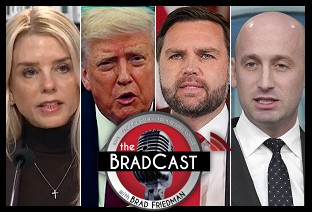 MAGA Exploiting Kirk's Death as Their 9/11: 'BradCast' 9/17/25
MAGA Exploiting Kirk's Death as Their 9/11: 'BradCast' 9/17/25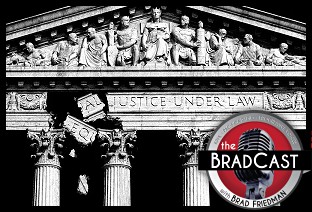 Our Crumbling Courts and Withering Rule of Law: 'BradCast' 9/16/25
Our Crumbling Courts and Withering Rule of Law: 'BradCast' 9/16/25 After Kirk Murder, 1st Amendment, Not 2nd, Under Attack: 'BradCast' 9/15/25
After Kirk Murder, 1st Amendment, Not 2nd, Under Attack: 'BradCast' 9/15/25 SCOTUS Suspension of 4th Amendment an Ominous Threat to Constitutional Republic
SCOTUS Suspension of 4th Amendment an Ominous Threat to Constitutional Republic
 VA GOP VOTER REG FRAUDSTER OFF HOOK
VA GOP VOTER REG FRAUDSTER OFF HOOK Criminal GOP Voter Registration Fraud Probe Expanding in VA
Criminal GOP Voter Registration Fraud Probe Expanding in VA DOJ PROBE SOUGHT AFTER VA ARREST
DOJ PROBE SOUGHT AFTER VA ARREST Arrest in VA: GOP Voter Reg Scandal Widens
Arrest in VA: GOP Voter Reg Scandal Widens ALL TOGETHER: ROVE, SPROUL, KOCHS, RNC
ALL TOGETHER: ROVE, SPROUL, KOCHS, RNC LATimes: RNC's 'Fired' Sproul Working for Repubs in 'as Many as 30 States'
LATimes: RNC's 'Fired' Sproul Working for Repubs in 'as Many as 30 States' 'Fired' Sproul Group 'Cloned', Still Working for Republicans in At Least 10 States
'Fired' Sproul Group 'Cloned', Still Working for Republicans in At Least 10 States FINALLY: FOX ON GOP REG FRAUD SCANDAL
FINALLY: FOX ON GOP REG FRAUD SCANDAL COLORADO FOLLOWS FLORIDA WITH GOP CRIMINAL INVESTIGATION
COLORADO FOLLOWS FLORIDA WITH GOP CRIMINAL INVESTIGATION CRIMINAL PROBE LAUNCHED INTO GOP VOTER REGISTRATION FRAUD SCANDAL IN FL
CRIMINAL PROBE LAUNCHED INTO GOP VOTER REGISTRATION FRAUD SCANDAL IN FL Brad Breaks PA Photo ID & GOP Registration Fraud Scandal News on Hartmann TV
Brad Breaks PA Photo ID & GOP Registration Fraud Scandal News on Hartmann TV  CAUGHT ON TAPE: COORDINATED NATIONWIDE GOP VOTER REG SCAM
CAUGHT ON TAPE: COORDINATED NATIONWIDE GOP VOTER REG SCAM CRIMINAL ELECTION FRAUD COMPLAINT FILED AGAINST GOP 'FRAUD' FIRM
CRIMINAL ELECTION FRAUD COMPLAINT FILED AGAINST GOP 'FRAUD' FIRM RICK SCOTT GETS ROLLED IN GOP REGISTRATION FRAUD SCANDAL
RICK SCOTT GETS ROLLED IN GOP REGISTRATION FRAUD SCANDAL VIDEO: Brad Breaks GOP Reg Fraud Scandal on Hartmann TV
VIDEO: Brad Breaks GOP Reg Fraud Scandal on Hartmann TV RNC FIRES NATIONAL VOTER REGISTRATION FIRM FOR FRAUD
RNC FIRES NATIONAL VOTER REGISTRATION FIRM FOR FRAUD EXCLUSIVE: Intvw w/ FL Official Who First Discovered GOP Reg Fraud
EXCLUSIVE: Intvw w/ FL Official Who First Discovered GOP Reg Fraud GOP REGISTRATION FRAUD FOUND IN FL
GOP REGISTRATION FRAUD FOUND IN FL

































